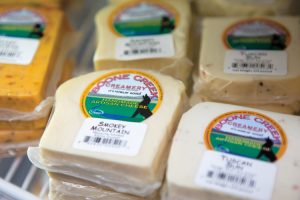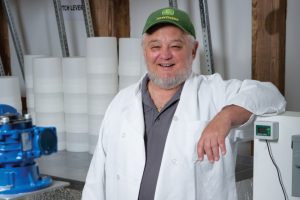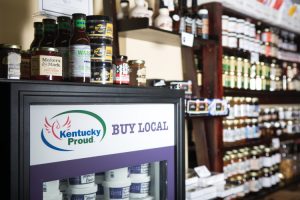Home > Kentucky > Kentucky Farm to Table > Value-Added Products Boost Kentucky Agriculture
Value-Added Products Boost Kentucky Agriculture

There is no such thing as an ugly tomato anymore. In the past, as many Kentucky farmers were harvesting tomatoes and other produce, they might cull those that were blemished or deemed too imperfect to sell in the grocery store produce bin or at the farmers market. It was survival of the least cosmetically flawed. “Tomatoes for retail have to be near perfect without a blemish on them,” explains Roger Snell, the farm-to-retail liaison for the Kentucky Department of Agriculture (KDA) and its Kentucky Proud program.
“That gets rid of about 40 percent of your yield. A lot of people now are taking what used to be thrown out and using them in sauces, salsas and things like that.”
That is but one example of the impact that value-added agriculture is having on Kentucky Proud producers and processors who are taking raw Kentucky ag products to create sauces, jellies, jams, cheeses, ice cream, soap, and much more. It’s a concept that is growing, according to Snell.
“It’s very much on the rise,” he says. “We haven’t come anywhere near the peak of opportunity on the value-added end.”

Extending the Season
As part of KDA’s Office for Agricultural Marketing and Product Promotion, Snell travels the state to bring together Kentucky Proud farmers with processors and others who can make a worthwhile connection.
“I’m kind of the matchmaker who provides leads and contacts for networking with both the producer and the buyer – and that can be distributors, manufacturers, restaurants, groceries, whatever – with the primary goal of helping these farmers get to market,” Snell says. “The beauty of value-added is you can extend the season and get even greater money out of the product.”
For example, two eastern Kentucky producers exemplify how some small farms can start at a grass-roots level and expand through value-added agriculture. Lucky Clover Farm in Madison County grows fresh vegetables and herbs, and sells baked breads made from ingredients grown on the farm. It also sells heirloom tomatoes, jams, and granola. In Corbin, Singing Hills Goat Farm makes and sells goat milk soaps and lotions.

Urban Agriculture
The value-added concept can also lead to more nontraditional agriculture. Ed Puterbaugh, for instance, has been handmaking artisan cheese at Boone Creek Creamery since 2008. His operation is located in a densely populated business district in Lexington, which doesn’t exactly evoke images of dairy farms and open pastures.
“My background was in clinical microbiology, so when I got into this as a hobby, I automatically understood the bacteria and what was going on,” Puterbaugh says. “My learning curve for cheesemaking was very short, and that gave me the flexibility to focus on being a really unique product line.”
Puterbaugh says he gets his milk from a nearby farm cooperative, adding that the main thing that makes his cheese special is that “we use Kentucky Proud milk.” His added value also comes from his urban location as a destination for tourists who might not visit a rural cheesemaker. Puterbaugh has also opened a Kentucky Proud retail store on one end of his facility, so visitors can shop for a variety of products in addition to his cheeses.

Another notable Lexington business is Crank & Boom Ice Cream Lounge. Owner Toa Green grew up helping in her family’s Thai restaurant and, from that experience, developed a passion for ice cream. The milk for her ice cream comes from Mennonite dairy producers Willis and Edna Schrock, who own JD Country Milk of Logan County.




Please help us help the farmers with recycling their AG film and plastics, drip tape and Green house film and the plastic wrap on the bales of cotton from the fields
If you would pass along our information to them. Which we all want to see that our states stay beautiful by recycling.
We now are able to recycle square bales as well as the round bales for the film and drip tape. As well as loose materials in some cases.
We also are able to give a rewards back on the some drip tapes if they are bale separately from your AG film.
With the rising cost of the landfills and not to mention we all want to protect our environment and the land.
If you interested in a program please contact me at my email or give me a call for further discussion.
Have a great day
Carol
We have a large dairy herd in Wisconsin. My wife and I would like to visit a cotton farm during harvest. We would like to see a John Deere cotton picker with the round baler. Thank You,